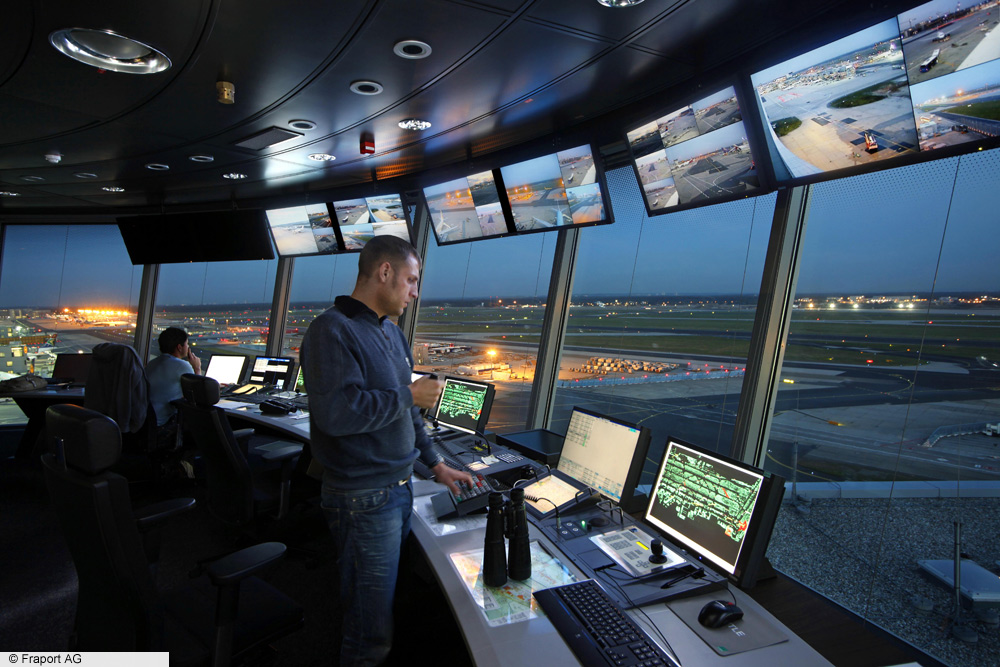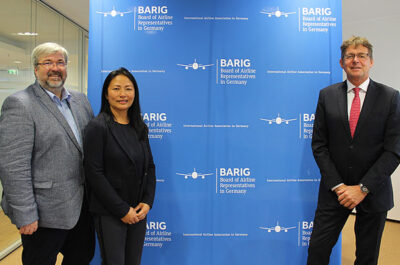
Frankfurt Airport, Tower.
Begun projects such as the “functional airspace blocks” (FAB, FABEC in Europe), aimed at replacing national air spaces, and the “Single European Sky ATM Research” (SESAR) programs, must further be consequently pursued.
All parties involved agree that the Single European Sky (SES) must be realized in order to create more capacities in European air space. In this regard, Michael Hoppe, Secretary General of the Board of Airline Representatives in Germany (BARIG), refers to the early attempts at air space harmonization in the 1990s and the EU regulations of 2004 containing the first legal foundations for the SES. Begun projects such as the “functional airspace blocks” (FAB, FABEC in Europe), aimed at replacing national air spaces, and the “Single European Sky ATM Research” (SESAR) programs, an initiative of the European Commission and EUROCONTROL to harmonize and integrate European air traffic management services, must further be consequently pursued. “The slow progress that has been made so far is no longer acceptable,” states Michael Hoppe and in this context additionally refers to the closing statement of the aviation summit in Hamburg on October 5th, 2018.
Creating new capacities with the SES
- The creation of a SES, oriented towards ideal flight processes, optimizes flight procedures and enhances efficiency.
- SES enables significantly improved usage of air space, thereby leading to a capacity that is three times higher compared to the year 2000.
- Since flight routes in the SES are shorter and more direct, fuel consumption and CO2 emissions as well as noise pollution per flight are reduced.
- A standardized and international flight management allows for more efficiency and lower overall costs. Furthermore, an uniform air traffic control certification eases flexible deployment of personnel.
Issues
- Up until now the integration of individual measures has failed due to national egoisms and national regulations.
- Some European member countries refuse a replacement of their national air space by a FAB. Despite the air space block over Germany, France, Switzerland and the BENELUX states being enforced since June 2013, national air traffic control services must further intensify their cooperations.
- At present, the individual national air spaces are coordinated and supervised by a separate national air traffic control service. For this reason, different technical systems are currently implemented in air traffic control, thereby making European air traffic management inefficient and expensive.
- Since the maximum capacity limit of the European sky is apparently reached already, additional factors such as inhospitable weather, strikes and staff shortages aggravate the situation.
Associations and Air Traffic Control are cooperating
- As already mentioned by a representative of the German Air Traffic Control (DFS) at the latest BARIG general assembly this summer, the DFS is intensively working on an optimization of air space capacities over Germany by shifting flights to different flight heights. Furthermore, the DFS utilizes more personnel wherever it is necessary and possible.
- Solutions for the adaption, equalization and optimization of traffic flows for more direct flight routes in the FABEC are already being developed by national air traffic control services.
- The Europe-wide harmonization must be advanced quickly to manage the increasing air traffic volume, which is forecasted to record an average growth of 2 percent until 2024.
- BARIG, the Federal Association of German Air Traffic Industry (BDL), DFS and the Working Group of German Airports (ADV) want to work on this topic together in a future-oriented manner.
Politics must also take action
- German politics must force and intensify their initiatives on an European level, meaning towards the European – Commission and the European parliament, to dismantle the scattered organization of air traffic control in Europe and to overcome the differently handled civil-military integration.
- EU plans were overrun by the actual air traffic volume so that targets and personnel planning must be urgently adjusted.
- The SES project must be promoted and realized more efficiently and with more ambition by the individual European states.
Michael Hoppe, Secretary General of BARIG explains, “In face of the increasing number of passengers and flights in and over Europe, the air traffic system must be urgently developed. Holistic concepts designed with foresight are required and national borders must be overcome to ensure safety and allow for better usage of air space. Airlines and associations are available for constructive cooperation with authorities, institutions and the system partners.”
Theodore is the Co-Founder and Managing Editor of TravelDailyNews Media Network; his responsibilities include business development and planning for TravelDailyNews long-term opportunities.





























































































































































































